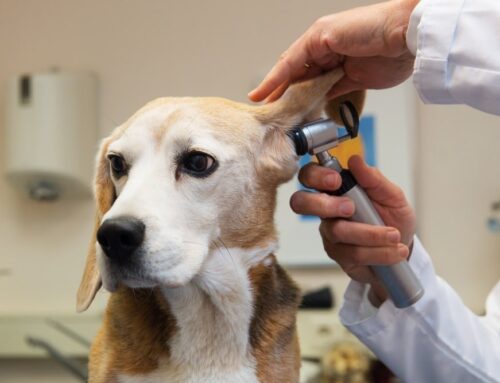As our pets age, they may face a variety of chronic health conditions that can impact their mobility, metabolism, and overall well-being. At Emerald Animal Hospital in Los Angeles, California, we understand the importance of early detection and proper management to help senior dogs enjoy a longer, more comfortable life. This guide aims to educate pet owners about the most common aging dog diseases, their symptoms, and the best treatment and management options available.
Concerned about your senior dog’s health? Schedule a check-up at Emerald Animal Hospital.
Osteoarthritis and Joint Pain in Senior Dogs
Understanding Osteoarthritis
Osteoarthritis is a progressive joint disease that leads to cartilage deterioration, resulting in pain and stiffness. This condition is more prevalent in large breeds, overweight dogs, and senior pets.
Symptoms of Osteoarthritis
- Limping or stiffness, especially after rest
- Reluctance to run, jump, or climb stairs
- Joint swelling and discomfort
- Difficulty standing up after lying down
Treatment & Management of Osteoarthritis
Managing osteoarthritis involves a combination of strategies aimed at reducing pain and improving mobility:
- Weight management: Helps reduce strain on joints.
- Joint supplements: Glucosamine, chondroitin, and omega-3s can support joint health.
- Low-impact exercise: Activities like short walks and swimming help maintain mobility without stressing joints.
- Pain management: Options include NSAIDs, laser therapy, and acupuncture.
Explore joint-friendly exercises in the Zoetis Petcare Guide.
Cognitive Dysfunction Syndrome in Senior Dogs
What Is Cognitive Dysfunction?
Cognitive dysfunction syndrome is a neurodegenerative disease that affects memory, awareness, and behavior, similar to Alzheimer’s disease in humans.
Symptoms of Canine Dementia
- Disorientation and confusion
- Increased anxiety or restlessness at night
- House soiling or loss of learned behaviors
- Decreased interaction with family members
Managing Cognitive Dysfunction in Senior Dogs
Effective management of cognitive dysfunction focuses on maintaining mental engagement and reducing stress:
- Mental stimulation: Puzzle toys and scent work keep the mind active.
- Antioxidant-rich diet and omega-3 supplements: Support cognitive health.
- Consistent routine: Helps reduce stress and anxiety.
- Medications like selegiline (Anipryl): Can slow progression.
Learn more about cognitive dysfunction in senior dogs from the Cornell Veterinary Guide.
Hypothyroidism in Aging Dogs
Understanding Hypothyroidism
Hypothyroidism occurs when the thyroid gland does not produce enough hormones, leading to a slowed metabolism. This condition is common in middle-aged and senior dogs.
Symptoms of Hypothyroidism
- Unexplained weight gain
- Lethargy and reduced activity
- Dry skin, hair loss, and a dull coat
- Cold intolerance
Treatment & Management of Hypothyroidism
Management of hypothyroidism involves hormone replacement and regular monitoring:
- Daily thyroid hormone replacement therapy (levothyroxine): Restores normal metabolism.
- Regular thyroid function tests: Ensure correct dosage.
- Healthy diet and moderate exercise: Support metabolic health.
Read more about hypothyroidism in dogs from the Cornell Veterinary Hypothyroidism Guide.
Diabetes Management in Senior Dogs
What Is Diabetes?
Diabetes is a metabolic disorder in which the body cannot properly regulate blood sugar levels. It is common in overweight dogs and certain breeds like Poodles, Dachshunds, and Beagles.
Symptoms of Diabetes in Dogs
- Increased thirst and urination
- Sudden weight loss despite increased appetite
- Cloudy eyes (cataracts)
- Recurring infections (urinary, skin)
Managing Diabetes in Senior Dogs
Managing diabetes requires consistent care and monitoring:
- Daily insulin therapy: Essential for regulating blood sugar levels.
- Consistent feeding schedule with a high-fiber, low-carb diet: Helps stabilize blood sugar.
- Regular blood sugar monitoring: Tracks treatment effectiveness.
- Routine veterinary checkups: Allows for treatment adjustments.
Discover more on diabetes management in pets with AAHA’s Guide to Managing Diabetes.
Cancer Awareness and Treatment in Senior Dogs
Common Types of Cancer in Senior Dogs
Cancer can take many forms in senior dogs, with some types more prevalent:
- Lymphoma: Affects lymph nodes, common in older dogs.
- Mast cell tumors: Skin cancer, ranging from benign to malignant.
- Hemangiosarcoma: Aggressive cancer of the spleen or heart.
- Osteosarcoma: Bone cancer, often seen in large breeds.
Symptoms of Cancer in Dogs
- Lumps or swelling that grow over time
- Unexplained weight loss
- Lethargy or weakness
- Difficulty breathing or persistent lameness
Cancer Treatment Options for Senior Dogs
Cancer treatment is tailored to the type and stage of the disease:
- Surgery, chemotherapy, or radiation therapy: Can be used to treat various cancers.
- Pain management and palliative care: Focuses on comfort.
- Routine checkups: Critical for early detection and intervention.
Learn more about cancer types in pets from AAHA Guide to Types of Cancer.

Preventive Care for Senior Dogs
Importance of Regular Veterinary Checkups
Regular wellness exams are vital for early detection of health issues:
- Biannual wellness exams: Help monitor health changes.
- Bloodwork and urine analysis: Assess organ function.
- Heart and lung evaluations: Ensure cardiovascular health.
Read about preventive testing recommendations for senior pets in this Zoetis Petcare Senior Pet Testing Guide.
Nutrition & Supplements for Aging Dogs
Proper nutrition can significantly impact a senior dog’s health:
- Joint-supportive diets: Include glucosamine and omega-3 fatty acids.
- Antioxidants: Support brain health and prevent cognitive decline.
- Weight management: Helps prevent obesity-related diseases.
Discover recommended supplements for aging dogs from Purina Senior Dog Nutrition Guide.
Early detection and proactive care are crucial to maintaining the health and comfort of senior dogs. Routine veterinary checkups, proper nutrition, and lifestyle adjustments can significantly contribute to their longevity and quality of life. If your senior dog is showing signs of any of these conditions, we encourage you to consider a wellness exam.
Book a senior pet wellness exam at Emerald Animal Hospital: Schedule an appointment here.









Leave A Comment